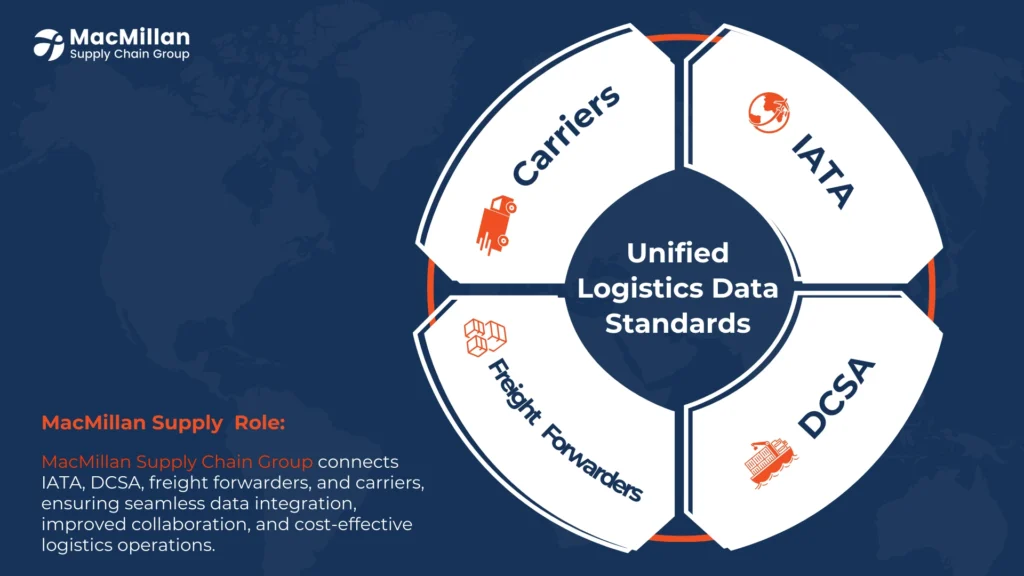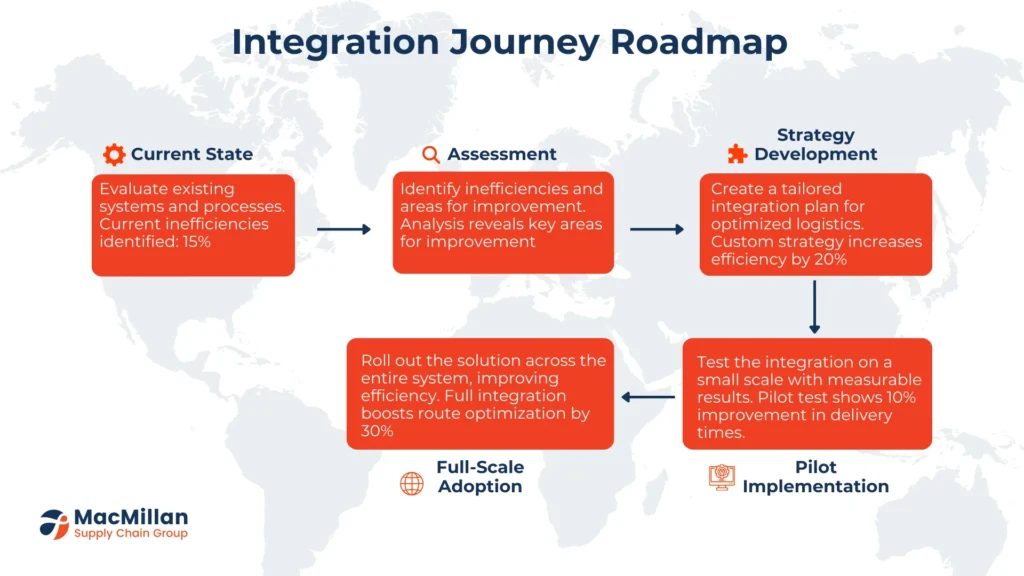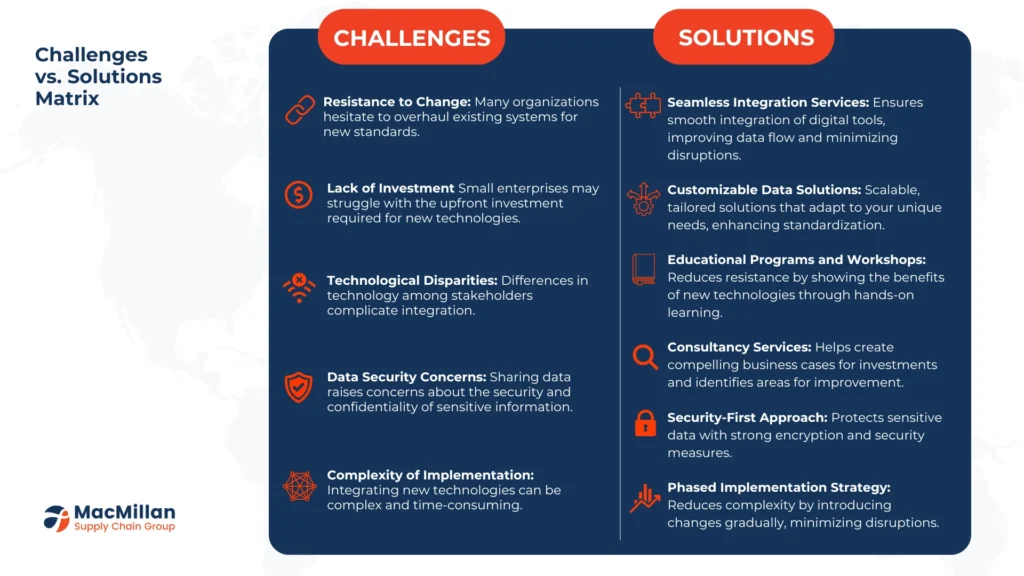Quick Summary and Overview
The adoption of Logistics data standards and integrated systems is not only advantageous but also necessary in the intricate realm. These factors offer a more efficient, streamlined operation and better service delivery as the industry transitions to digitization. Nevertheless, as evidenced by successful implementations like WebCargo’s API and project44’s eBOLs, the path is filled with difficulties that need for cooperation and leadership to overcome.
Introduction
The logistics industry is synonymous with constant movement and complexity, requiring precision across its multifaceted operations. In light of increasing volumes of digitized data, the need for standardized data formats and seamless integration of digital tools has become more pronounced than ever. Through industry wide standards, logistics can boost collaboration, reduce errors, and streamline operations, ultimately leading to cost savings and environmental benefits. However, achieving these improvements necessitates overcoming significant challenges and fostering a collaborative spirit among stakeholders.

The Call for Logistics Data Standards
At this crucial point, uniform data standards have become essential rather than optional in the logistics sector. At the forefront, groups like the Digital Container Shipping Association and the International Air Transport Association are actively creating these standards. But there are many challenges in the way of widespread acceptance.
Many businesses are hesitant to adopt new standards because they have made significant investments in proprietary systems and formats. Because of this hesitancy, the supply chain becomes fractured and data silos continue to exist, making it difficult to collaborate and communicate effectively. In addition to impeding efficiency, a lack of standardization raises the possibility of mistakes and misunderstandings.
Moreover, the absence of uniform standards makes it challenging to leverage advanced technologies like artificial intelligence and machine learning effectively. These technologies thrive on large, consistent datasets something that’s hard to achieve without industry wide standards.
The goal of promoting data standards is to provide the groundwork for upcoming developments as well as to increase operational efficiency. The logistics sector may open the door to more advanced analytics, automation, and predictive modeling by creating a common language for data.
The Need for Effective Integration
The increasing use of digital tools by logistics companies to handle different parts of their operations necessitates efficient integration due to the resulting system complexity. From warehouse management systems to transportation management software, and from customer relationship management tools to finance systems, the contemporary logistics environment is defined by a wide range of software solutions, each of which addresses particular requirements.
Without proper integration, these disparate systems can create more problems than they solve. Data silos emerge, leading to duplicated efforts, inconsistent information, and a lack of real time visibility across operations. This fragmentation can result in missed opportunities, inefficient resource allocation, and suboptimal decision making.
Effective integration, on the other hand, can eliminate redundant tasks, minimize errors, and significantly enhance service efficiency. By creating a unified system where data flows seamlessly between different tools and departments, logistics companies can achieve a holistic view of their operations. This integrated approach enables real-time tracking, better forecasting, and more agile responses to market changes.
Furthermore, integration sets the stage for advanced analytics and business intelligence. When data from various sources is consolidated and standardized, it becomes possible to uncover deeper insights, identify trends, and make data-driven decisions that can transform the business.

Learning from Success: Case Studies
Even though implementing data standards and accomplishing seamless integration involves considerable obstacles, there are encouraging success examples that show the way forward. These case studies offer important insights into implementation tactics in addition to illustrating the observable advantages of standardization and integration.
The carrier API integration offered by WebCargo is one noteworthy example. WebCargo has transformed the freight forwarder booking process by standardizing the sharing of air cargo pricing and capacity data. Faster quotation creation, real time booking capabilities, and increased pricing and capacity information accuracy are the results of this integration. Both carriers and forwarders have benefited from the more effective and transparent air freight market that has resulted.
Another success story comes from project44’s deployment of electronic bills of lading for less than truckload (LTL) shipments. By digitizing this crucial document, project44 has significantly reduced manual errors in billing processes, enhanced invoicing precision, and streamlined pickup and delivery tasks. The adoption of eBOLs has not only improved operational efficiency but also contributed to substantial cost savings and improved customer satisfaction.
These examples showcase how successful data standardization and integration can accelerate transformative progress within the industry. They highlight the importance of collaboration between different stakeholders and the need for a clear vision of the benefits that can be achieved.
The Industry-Wide Collaborative Push
Overcoming the inertia of slow adoption requires bold leadership and a compelling business case. The logistics industry stands at a crossroads where the potential benefits of standardization and integration are clear, but the path to widespread adoption remains challenging.
Industry players must cooperate to develop a cohesive framework that maximizes the utility of data standards. This collaboration should extend beyond individual companies to include industry associations, technology providers, and regulatory bodies. By working together, the industry can address common challenges, share best practices, and create standards that are truly universal and beneficial for all.
In addition to guaranteeing greater efficiency, fostering a collaborative ecosystem will stimulate innovation. New services, better customer experiences, and more sustainable operations are made possible when data can move freely and securely throughout the supply chain.
A long-term perspective that considers the revolutionary possibilities of standardized, interconnected systems rather than just the short term expenses is necessary for leadership in this field. Businesses can establish themselves as thought leaders and obtain a competitive advantage in the increasingly digital logistics market by taking the initiative to embrace and promote industry standards.

Common Problems and Our Solutions
Challenges in Adoption
- Challenges in Adoption:Resistance to Change: Many organizations remain hesitant to overhaul established systems in favor of new standards.
- Lack of Investment: Embracing new technologies and standards requires significant upfront investment, which can be a barrier for smaller enterprises.
- Technological Disparities: Variances in technological capabilities among stakeholders complicate integration efforts across the board.
- Data Security Concerns: The increased sharing of data raises questions about security and confidentiality.
- Complexity of Implementation: Integrating new standards into existing systems can be a complex and time consuming process.
MacMillan Supply Chain Solutions
By providing comprehensive solutions that are suited to the demands of modern logistics, MacMillan Supply Chain takes an inventive approach to overcoming these obstacles:
- Seamless Integration Services: By avoiding operational disruptions, our cutting-edge platform guarantees the seamless integration of various digital tools into a cohesive system. We integrate with your current infrastructure to build a unified ecosystem that improves supply chain visibility and data flow.
- Tailored Data Solutions: We offer scalable data management services that accommodate each client’s particular requirements, encouraging a customized standardization strategy. In close collaboration with you, our team of professionals determines your particular needs and creates solutions that meet industry norms and tackle your particular problems.
- Educational Programs and Workshops: Our guided learning initiatives aim to reduce resistance to change by demonstrating the tangible benefits of data and system integration. We offer comprehensive training programs for your staff, ensuring they are well equipped to leverage new technologies and standards effectively.
- Consultancy Services: MacMillan’s industry experts offer consultation to help create compelling business cases for technology investments, ensuring alignment with strategic goals and market demands. We provide in depth analysis of your current systems, identify areas for improvement, and develop roadmaps for successful implementation of data standards and integration.
- Security First Approach: We prioritize data security in all our solutions, implementing robust encryption, access controls, and compliance measures to safeguard your sensitive information. Our team stays abreast of the latest security threats and best practices to ensure your data remains protected.
- Phased Implementation Strategy: We propose a phased deployment strategy to reduce adoption complexity. By integrating new standards and systems gradually, this approach minimizes interference with your current operations while gradually enhancing your capabilities.
Implementation Tips
To successfully overcome these obstacles and realize the full benefits of data integration and standardization in your logistics operations:
- To find integration problems and areas where standardization could have the biggest advantages, start by performing a thorough audit of your current systems.
- To emphasize the efficiency benefits of standardized data formats and technologies, spend money on workforce education. Make sure everyone on your team is aware of the long-term goals and advantages of these adjustments.
- Begin small with pilot initiatives that show immediate benefits and generate enthusiasm for more extensive deployments.
- Collaborate with industry partners and associations to stay informed about emerging standards and best practices in logistics data management.
- Partner with innovation-driven companies like MacMillan Supply Chain to access exclusive insights and custom solutions that can revolutionize your operations.
Don’t let the complexities of data standardization and integration hold your logistics operations back. MacMillan Supply Chain is here to guide you through every step of the process, from initial assessment to full implementation and beyond. Our tailored solutions and expert team can help you overcome challenges, streamline your operations, and achieve new levels of efficiency and competitiveness.
Ready to transform your logistics operations with cutting-edge data standards and integration? Contact MacMillan Supply Chain today for a personalized consultation and discover how we can help you stay ahead in the rapidly evolving world of logistics.
FAQs
Data standards in logistics refer to uniform guidelines that ensure consistency and compatibility in how data is shared and managed among different industry stakeholders. These standards cover aspects like data formats, communication protocols, and information exchange methods.
MacMillan's Solution: We offer comprehensive guidance on adopting and implementing the latest industry data standards, ensuring your systems are compatible with global logistics networks.
By adopting data standards, logistics companies can improve collaboration, eliminate redundancies, reduce errors, and achieve greater efficiency across operations. Standardization also facilitates better analytics and decision-making.
MacMillan's Solution: Our team can help you quantify the potential benefits of standardization for your specific operations, creating a clear business case for implementation.
Electronic Bills of Lading (eBOLs) reduce manual errors in billing processes, enhance invoicing precision, and streamline pickup and delivery tasks, boosting overall efficiency and cost-effectiveness.
MacMillan's Solution: We provide seamless integration of eBOL systems into your existing workflows, maximizing the benefits while minimizing disruption.
Technology in logistics, such as real-time tracking and route optimization, helps reduce manual errors, improve service efficiency, and deliver cost savings. It also enables better visibility and control over supply chain operations.
MacMillan's Solution: Our technology consultants can assess your current systems and recommend cutting-edge solutions that align with your operational goals.
Overcoming resistance requires showcasing the long-term benefits of standardization, investing in staff training, and collaborating with industry leaders to create compelling business cases.
MacMillan's Solution: We offer change management services and training programs designed to smooth the transition and build enthusiasm for new standards among your team.
Integration is key to eliminating redundant tasks, reducing errors, and improving visibility and efficiency across diverse platforms and stakeholders within a logistics operation.
MacMillan's Solution: Our integration experts can create a unified system that connects all your logistics tools, providing a single source of truth for your operations.
Companies should start by assessing their current systems, engage in educational initiatives to promote standardization benefits, and collaborate with solution providers like MacMillan Supply Chain for tailored integration.
MacMillan's Solution: We offer end-to-end support, from initial assessment to full implementation, ensuring a smooth transition to standardized, integrated logistics operations.
Investing in the future of your logistics operations starts today. Collaborate with MacMillan Supply Chain to unlock the full potential of your data and reach new heights in operational excellence.




